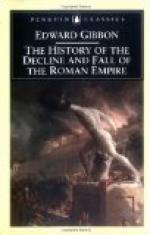|
This section contains 3,043 words (approx. 11 pages at 300 words per page) |

|
SOURCE: Mason, H. A. “Gibbon's Irony.” Cambridge Quarterly 3, no. 4 (autumn 1968): 309-17.
In the following essay, Mason examines Gibbon's use of irony in describing early Christians in Chapter 15 of the Decline and Fall.
And shaped his weapon with an edge severe, Sapping a solemn creed with solemn sneer, The lord of irony …
Byron
… the contrast [between Swift's irony and Gibbon's] is so complete that any one point is difficult to isolate. Gibbon's irony, in the fifteenth chapter, may be aimed against, instead of for, Christianity, but contrasted with Swift's it is an assertion of faith. The decorously insistent pattern of Gibbonian prose insinuates a solidarity with the reader (the implied solidarity in Swift is itself ironical—a means to betrayal), establishes an understanding and habituates to certain assumptions. The reader, it is implied, is an eighteenth-century gentleman (‘rational’, ‘candid’, ‘polite’, ‘elegant’, ‘humane’); eighteen hundred years ago he would have...
|
This section contains 3,043 words (approx. 11 pages at 300 words per page) |

|


